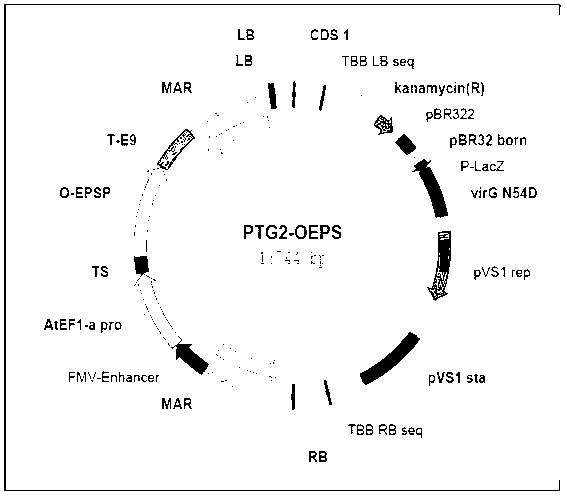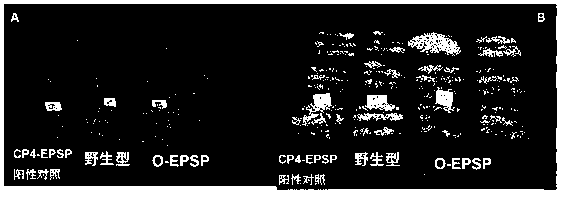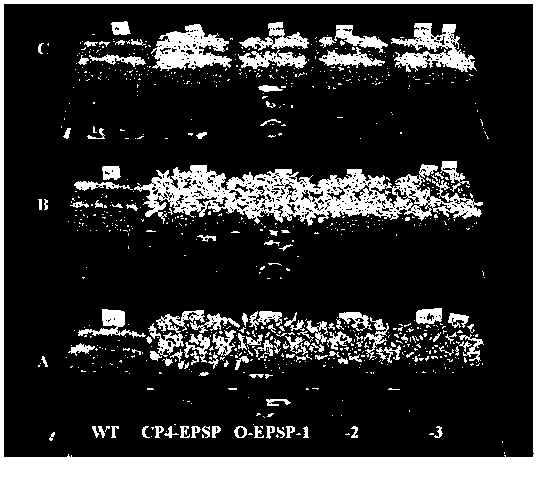5-enolpyruvyl-shikimate-3-phosphate (EPSP) synthase gene from ochrobactrum anthropi and application thereof
A gene and protein technology, applied in the field of EPSP synthase gene and its application in transgenic plants, can solve the problems that there are no reports of glyphosate-resistant gene crops entering the commercialization stage.
- Summary
- Abstract
- Description
- Claims
- Application Information
AI Technical Summary
Problems solved by technology
Method used
Image
Examples
Embodiment 1
[0060] Example 1 Glyphosate-resistant strain-Bacillus pallidus Ochrobactrum anthropi Isolation, purification and identification of KT-CGL-7-7
[0061] 1. Source of soil samples
[0062] Soil samples were collected from 5 cm below the soil layer of the experimental fields sprayed with glyphosate.
[0063] 2. Isolation and purification of glyphosate-resistant strains
[0064] Enrichment of bacterial strains: Weigh 20 grams of soil samples respectively, one of which is added to 1 / 10LB liquid medium containing 100mg / L glyphosate (filling volume is 50ml / 300ml Erlenmeyer flask), the other Soil samples were added to the 1780 modified liquid medium containing 100mg / L glyphosate (the filling volume was 50ml / 300ml Erlenmeyer flask), placed in 30 o The enrichment culture was carried out in a C shaker at 200 rpm.
[0065] Acclimatization and purification of strains: Each time of enrichment culture for 7 days, the culture was centrifuged at 3000rpm for 10min, the supernatant was disca...
Embodiment 2
[0071] Example 2 Cloning of DNA fragments highly tolerant to glyphosate
[0072] 1. PCR method to obtain some DNA fragments with high tolerance to glyphosate
[0073] According to the published in NCBI Ochrobactrum anthropi Sequence Design of EPSP Synthase Gene
[0074] Primer 1-F (sequence shown in SEQ ID No: 3): 5′-ATGCAGGCCATGGGTGCCAGGATT-3′
[0075] Primer 1-R (sequence shown in SEQ ID No: 4): 5′-GCGATGCGGTGGTCGAGGTGGGTT-3′
[0076] According to the published in NCBI Brucella melitensis Sequence Design of EPSP Synthase Gene
[0077] Primer 2-F (sequence shown in SEQ ID No: 5): 5′-CGGGATCC ATGTCCCATTCCGCATGCCCG-3′
[0078] Primer 2-R (sequence shown in SEQ ID No: 6): 5'- CCGCTCGAGCGACATTCTGCACCGCTTTCGGCAAT-3'
[0079] according to O. anthropi and B. melitensis Designing primers for homologous sequences of the EPSP synthase gene
[0080] Primer 3-F (sequence shown in SEQ ID No: 7): 5′-GATGCCTCGCTTTCCAAGCGCC-3′
[0081] Primer 3-R (sequence shown in SEQ ID N...
Embodiment 3
[0094] Example 3 Construction of Plant Expression Vector PTG2-OEPS
[0095] According to the O-EPSP synthase gene sequence, design primers 7-F and 7-R
[0096] Primer 7-F (sequence shown in SEQ ID No: 15): ACATGTATGTCCCATTCCGCATGC
[0097] Primer 7-R (sequence shown in SEQ ID No: 16): CCCGGGTCATTCTGCTGCGCCCG
[0098] The O-EPSP synthase gene sequence was amplified by PCR with primers 7-F and 7-R, and then digested with Pci Ⅰ and Xma Ⅰ to obtain an insert fragment; the PTG1 vector taken from the company was digested with Pci Ⅰ and Xma Ⅰ, Then use ligase to connect the above-mentioned insert fragment and vector, transform the ligated product into E. coli DH5α strain, select positive clones after culturing and screening in 2×YT medium containing 50 mg / L kanamycin, extract the plasmid and select the correct sequence by sequencing The clone obtained was a plasmid with the target gene, named PTG2-OEPS, see attached figure 1 .
PUM
 Login to View More
Login to View More Abstract
Description
Claims
Application Information
 Login to View More
Login to View More - R&D
- Intellectual Property
- Life Sciences
- Materials
- Tech Scout
- Unparalleled Data Quality
- Higher Quality Content
- 60% Fewer Hallucinations
Browse by: Latest US Patents, China's latest patents, Technical Efficacy Thesaurus, Application Domain, Technology Topic, Popular Technical Reports.
© 2025 PatSnap. All rights reserved.Legal|Privacy policy|Modern Slavery Act Transparency Statement|Sitemap|About US| Contact US: help@patsnap.com



